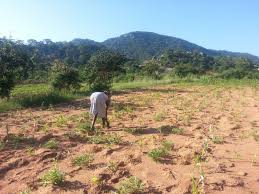By Patricia Mashiri
Masvingo province is currently experiencing a dry spell compared to the 2016-17 farming season which received high rainfall amounts that resulted in bumper harvests. High temperatures are being experienced in the province with no adequate rains to till the lands.
Nomusa Madakadze, the Agritex Extension Officer for Masvingo North Ward 1, in a recent interview, highlighted that very low rainfall amounts of less than 100 mililitres have been received so far.
“Rivers are not flowing because of very low and unevenly distributed rains. In my area most crops are in late vegetative stage and are moisture-stressed especially the maize crop but groundnuts are in a fair condition. We also note that not more than 0,5 hectares of the land have been tilled per household and the ridges are tied.
“As an Agritex Officer I want to advise farmers to practice mid-season water conservation by practicing pot holing, tied ridges as well as mulching and keep the fields weed-free as much as possible. Farmers should ensure that their previous grain is kept safe from damage by pests in case the season fails,” Madakadze said.
Some farmers in Mwenezi district under Chief Maranda have resorted to drought-resistant crops such as millet and sorghum which they think they will survive in the extreme high temperatures in the province.
They are also complaining that this season because of the low rains they will not be able to make money through the harvest of mopane worms. Painos Mapepeta, a farmer from Masvingo North Ward 1 said this seems to be a very bad season for them as farmers who depend on land produce for their survival.
“This season we are not expecting anything from the fields because the rains have not been so good to us. I don’t have off-season crops because of the weather changes which we have experienced this time. We have to look for other ways to pay for our children’s school fees since we now count this season as a failure,” Mapepeta said.
President Emmerson Mnangagwa has promised a continuation of the command agriculture programme to include livestock and fisheries. A turnaround of agriculture is of paramount importance to ensure that the new dispensation delivers on its promise to improve the economy.
